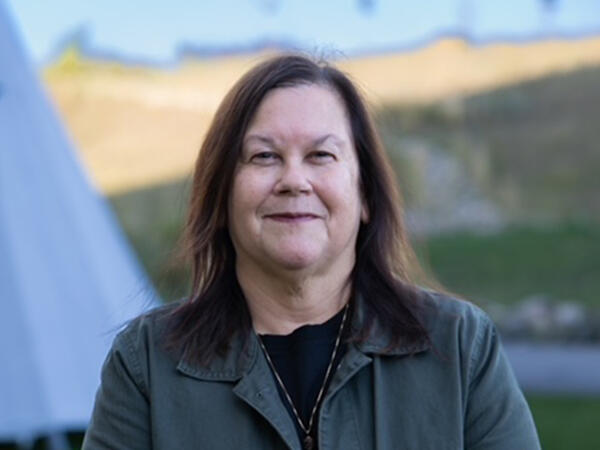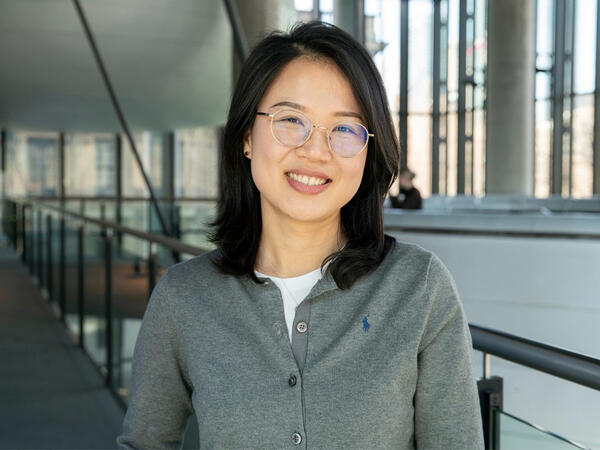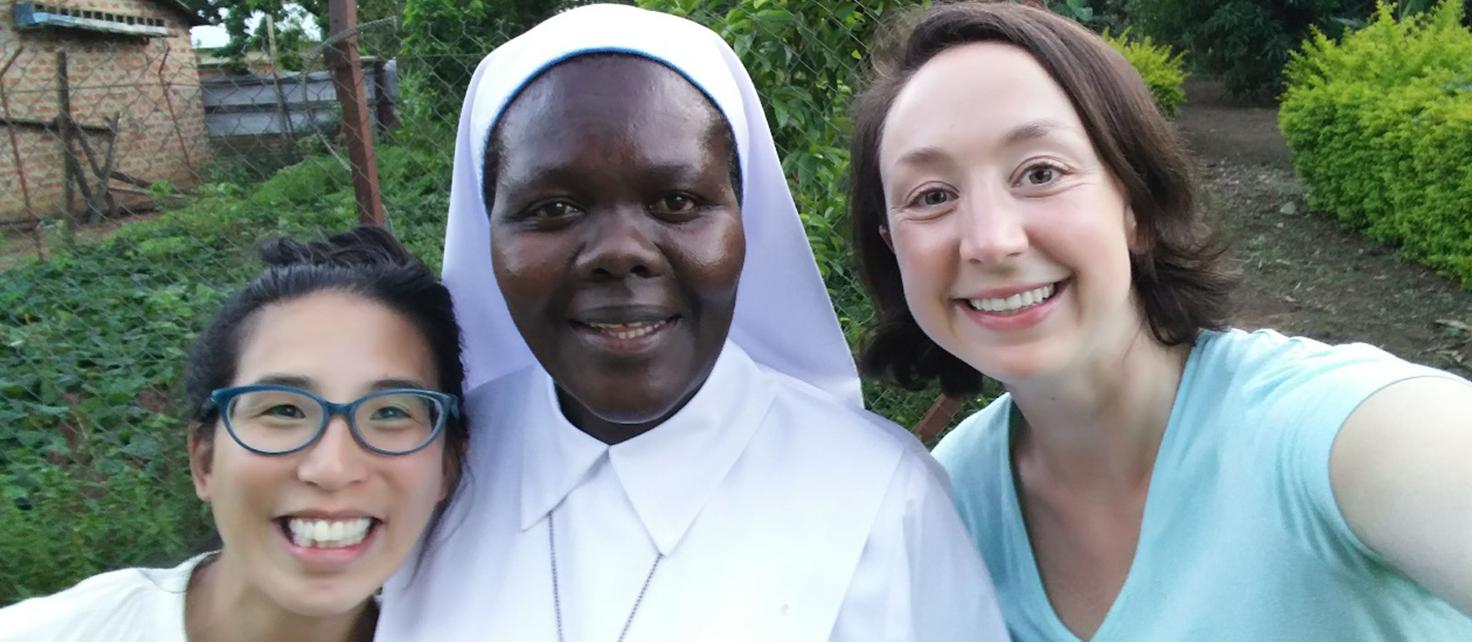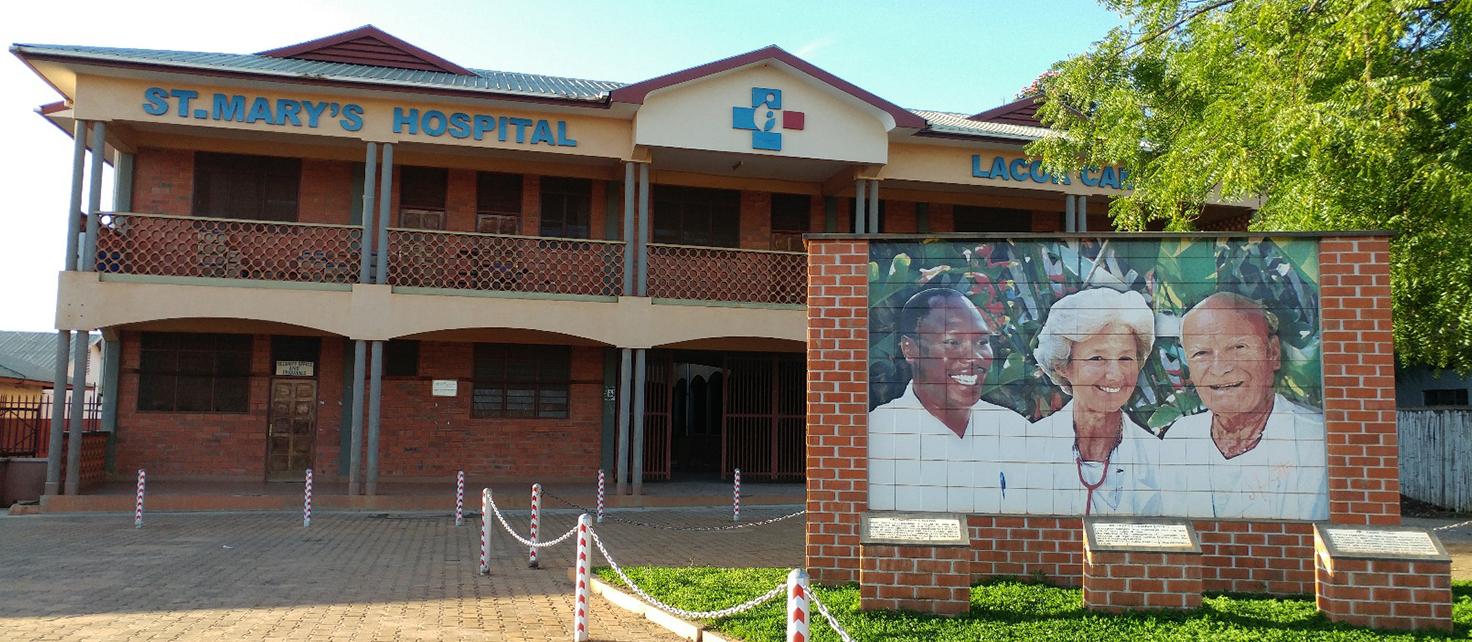PharmD for Pharmacist student Tracy Chin (left) pictured with her preceptor Sister Josephine Oyella and fellow student Charlotte Boulanger.
Rotation in Uganda helped pharmacist and student Tracy Chin gain key skills and grow in profession
As a hospital pharmacist working in Calgary, Tracy Chin has treated many patients presenting with heart attacks, lung conditions and chronic diseases. But during an international pharmacy rotation in Uganda, she saw conditions that were completely unfamiliar to her – snake bites, malaria, tuberculosis and rare complications of HIV.
Chin says that treating patients with a different set of conditions than she was used to, combined with working in a foreign culture and environment, presented many personal and professional challenges. But it was also immensely rewarding, making her more adaptable and appreciative of how pharmacists impact their patients’ care.
“I saw challenges I never thought I would ever see in my career,” she says. “A rotation like this offers you a different way of looking at your own practice.”
Chin earned a BScPharm from the University of Alberta in 2010 and started the PharmD for Pharmacists program at the Leslie Dan Faculty of Pharmacy (LDFP) through distance learning in January 2018. She heard about the opportunity for international rotations at the program’s orientation session and immediately knew she wanted to participate. In May 2019, she and another student started a 10-week rotation at St. Mary’s Hospital Lacor in Gulu, Uganda.
The LDFP offers more than 20 international rotations every year to help students grow their awareness of global health and different cultures, although these experiences are currently on hold due to the COVID-19 pandemic. Chin adds that these rotations show the breadth of pharmacy practice.
“These rotations offer pharmacists and pharmacy students an experience they could never get in Canada,” she says. “Your responsibilities and work conditions may be completely different from what you’re used to.”
Chin’s first responsibility in her Ugandan rotation was a project to develop and implement new processes in the hospital pharmacy. During the second part of the rotation, she worked in the hospital in a similar capacity to her role in Calgary.
St. Mary's Hospital in Lacor, Uganda
Adaptability key for succeeding in new environment
The experience opened her eyes to how pharmacy practice in Uganda had adapted to meet their circumstances and needs. Patients were often very sick when they came to the hospital or had complex conditions, and doctors and pharmacists often did not have access to equipment and medication that are common in Canada.
Chin says that treatment guidelines she took for granted in Canada are sometimes impossible to follow in countries with limited resources where certain medications and testing protocols are not available, and health care professionals have had to adapt.
“Things I knew as true are sometimes impossible in resource-limited countries,” she says, citing the diabetes management guidelines as one example. “The blood test recommended in international guidelines and commonly used in Canada to test for and manage diabetes is not the best approach in Uganda, where many patients get blood transfusions regularly. These tests would not be accurate for managing diabetes for many of their patients.”
Even self-monitoring was challenging for patients, as glucose strips were inaccessible or unaffordable. Instead, the pharmacy team focused on educating patients about their diet and how to monitor their symptoms in other ways.
Chin says the rotation allowed her to develop transferrable skills that will be useful wherever her career takes her. She became a better leader and communicator through her work to implement new processes at the hospital, and she learned how to better advocate for her patients to receive safe and effective treatments.
“This rotation changed my life, and I am so thankful that the Faculty has offered these rotations,” she says. “I met amazing people, improved my skills and became a better pharmacist, and broadened my view of the world.”
Perhaps most importantly, she became more adaptable. She learned to work in an environment with different conditions and resources than she was used to, and she changed her approach to communicating with patients to better suit their culture and needs.
“In my experience, I needed a warmer, more personal approach with my patients in Uganda, becoming friends with some of them while still having a professional limit,” she says. “These patients really wanted to know as much as possible about their own health and medications, and they were big advocates for their own health.”
She says adaptability is key for any student considering an international opportunity. “You have to keep an open mind. If you go to these rotations expecting certain things, you might not learn as much as if you’re open to whatever they have to offer you,” she says.
With Chin nearly finished her degree, she says she hopes to have more opportunities to work internationally in the future, perhaps even returning to St. Mary’s.
“This rotation changed my life, and I am so thankful that the Faculty has offered these rotations,” she says. “I met amazing people, improved my skills and became a better pharmacist, and broadened my view of the world.”
More News
Image

Pharmacy alum sees change in acceptance of Indigenous cultures in health care
During Deborah Emery’s 40-year pharmacy career, she provided care in Sioux Lookout, Thunder Bay and Manitoulin Island.
Read More
Image

Grad to Watch: Jackie Fule Liu’s research focuses on better outcomes for diabetes patients
A recent PhD graduate, Jackie Fule Liu combines hands-on skill and big-picture thinking to help tackle diabetes care challenges.
Read More
Image

U of T community members recognized with Order of Canada
Congratulations to Dean Emeritus and Professor K. Wayne Hindmarsh on his appointment.
Read More

